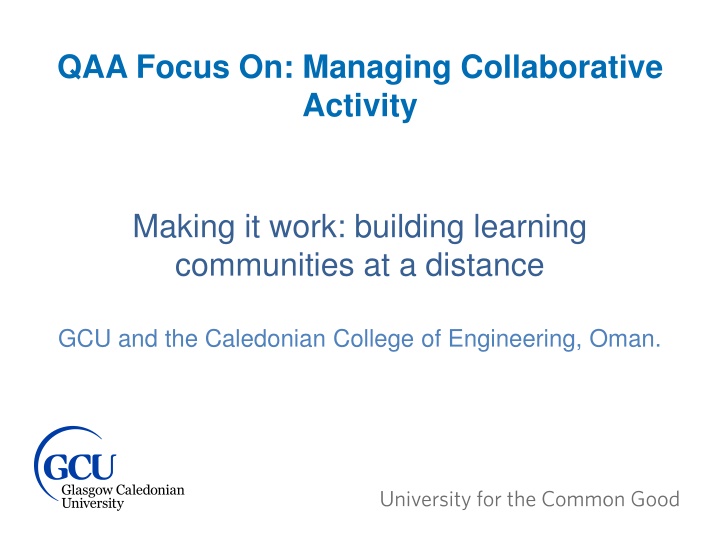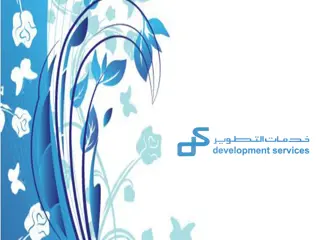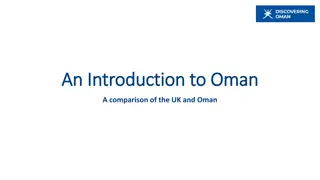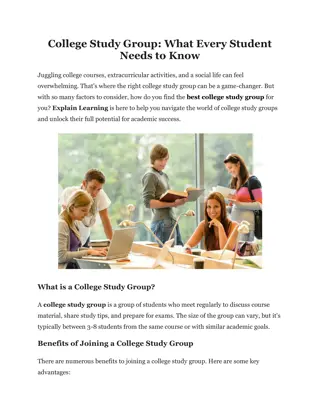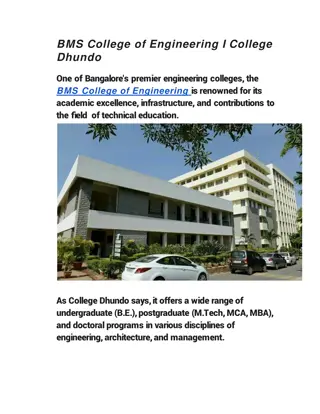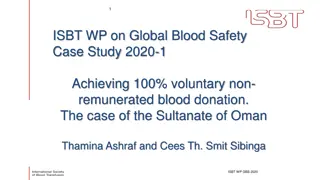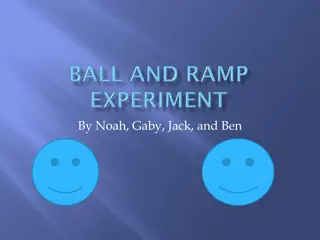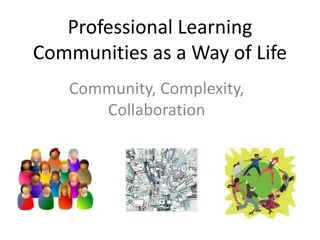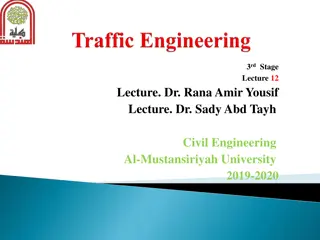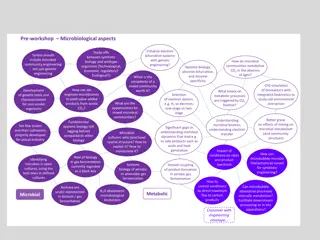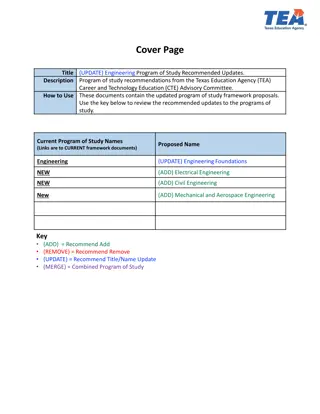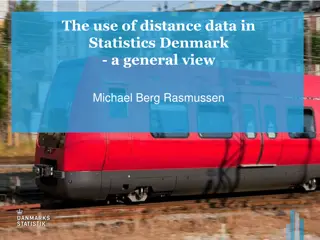Building Learning Communities at a Distance: Case Study of GCU and the Caledonian College of Engineering, Oman
Managing collaborative activity in distance learning settings involves establishing strong relationships, addressing initial challenges, taking remedial actions, and developing sustainable support systems for expansion. This case study highlights the journey of GCU and the Caledonian College of Engineering in Oman, focusing on overcoming challenges, implementing remedial actions, and fostering collaborative initiatives to build learning communities at a distance.
Download Presentation

Please find below an Image/Link to download the presentation.
The content on the website is provided AS IS for your information and personal use only. It may not be sold, licensed, or shared on other websites without obtaining consent from the author.If you encounter any issues during the download, it is possible that the publisher has removed the file from their server.
You are allowed to download the files provided on this website for personal or commercial use, subject to the condition that they are used lawfully. All files are the property of their respective owners.
The content on the website is provided AS IS for your information and personal use only. It may not be sold, licensed, or shared on other websites without obtaining consent from the author.
E N D
Presentation Transcript
QAA Focus On: Managing Collaborative Activity Making it work: building learning communities at a distance GCU and the Caledonian College of Engineering, Oman.
Establishing the relationship Caledonian College of Engineering established in 1996 as a private venture to fulfil a need for engineering education. Initial agreement (in summary) that GCU would Provide advice and guidance during set up. Appoint the Principal. Approve Diploma programmes for delivery at the College. Provide opportunity to articulate to Level 3 in Glasgow.
Initial Challenges Staff buy-in. Ensuring effective oversight. Significant costs for staff secondments and travel to Oman. Lack of student engagement/uptake of articulating pathway opportunities. Articulating students experienced cultural and language difficulties.
Remedial action Appointment of a new Principal, previously Asst. Principal at GCU GCU Quality Assurance systems and processes implemented in 1998. Foundation programme introduced: English, Mathematics and IT Skills refresh Study skills, including note taking, library use, report writing, academic referencing Conforms to the Oman Academic Accreditation Authority s national standard for foundation studies.
Remedial action Incentivised staff participation. Commitment to 12 week GCU teaching per session. Workshops and staff development. GCU PhD registration for CCE staff.
Developing the relationship One programme piloted to degree level in session 2000/01, with two more in 2001/02. Expansion over time to delivery in Oman of 10 GCU approved Honours degree programmes. Removed the need for students to transfer to complete Honours degree awards. All programme approval and development work undertaken with on-site input from external academic peers from UK HE sector.
Supporting Systems for Expansion Annually updated Liaison handbook covering; Effective Quality Assurance and Enhancement processes Assessment regulations and graduation Academic Administration Academic Calendar
Student Engagement in Quality Student, Staff Consultative Groups Representation on Programme Boards Ability to input to programme approval and review process Ability to provide feedback at modular level Opportunity to meet/discuss programme with External Examiners Frequent visits by GCU staff
Further Development Development to Masters level in 2008 Improvements in IT give students greater access to GCU systems Overhaul of GCU learning, teaching and assessment strategies and embedding of a new Strategy for Learning
Enablers Strategy 2020 Strategy for Learning Evolving Technologies
Strategy 2020 By 2020, Glasgow Caledonian University will have a global reputation for delivering social benefit and impact through education, research and social innovation. We will be recognised as the University for the Common Good that transforms lives, enriches cities and communities, innovates for social and economic impact, engages globally and aligns with others in partnership and collaboration to deliver our goals.
Strategy 2020 By 2020, Glasgow Caledonian University will have a global reputation for delivering social benefit and impact through education, research and social innovation. We will be recognised as the University for the Common Good that transforms lives, enriches cities and communities, innovates for social and economic impact, engages globally and aligns with others in partnership and collaboration to deliver our goals.
Strategy for Learning Single goal, to develop graduates who will be: Proficient in their discipline, enterprising, responsible and capable of fulfilling leadership roles in different organisational and cultural contexts.
Strategy for Learning Distinctive approach to learning, based on engagement-led learning and real world problem solving. Intended to promote an outstanding student experience. Applicable to all GCU programmes.
Strategy for Learning Distinctive approach to learning, based on engagement-led learning and real world problem solving. Intended to promote an outstanding student experience. Applicable to all GCU programmes.
Strategy for Learning Engaged learning Responsible Leadership and Professionalism Divergent thinking GCU SfL Flexible, Inclusive, Accessible learning Entrepreneurship Real world Problem solving Broad & Deep Learning Global learning
SfL Enablers : Digital Development / University Systems Cross platform - always available
Engaged Learning Help students to engage to maximise their potential Develop sense of belonging, commitment to individual student experience Acknowledge students as partners in shaping and enhancing the student experience. Achieved through learning opportunities which are: Project based, interdisciplinary, group based, co-designed and personalised.
Divergent Thinking Developing the capacity to tackle complex global challenges and real-world problems. Generating creative ideas by exploring many possible solutions, drawing on ideas from different disciplines and areas, through which often unexpected connections are made. Use of collaborative web-based technologies to support geographically dispersed groups as well as social networking platforms.
Mapping to UK- SPEC (C.Eng) A. Use a combination of general and specialist engineering knowledge and understanding to optimise the application of existing and emerging technology. Apply appropriate theoretical and practical methods to the analysis and solution of engineering problems. Provide technical and commercial leadership. Demonstrate effective interpersonal skills. Demonstrate a personal commitment to professional standards, recognising obligations to society, the profession and the environment. B. C. D. E.
Embedding Strategy for Learning at CCE Greater emphasis on group based activities. Students encouraged to undertake industry based/funded projects. Discussion forum through social media and CCE learn. Access to GCU Learn. Use of industry speakers/guest lecturers. Staff exchange visits to/from GCU facilitate good practices in learning and teaching. College scholarships for industrial training abroad.
Future Developments Potential expansion of Masters provision Review of current undergraduate provision OAAA visit to CCE in 2016/17
Alumni feedback Caledonian College has given me some wonderful opportunities, not only learning experiences but also some knowledge in management and responsibilities. the years spent on the Construction Engineering programme at Caledonian College were the most formative and beneficial years of my life. Apart from academic coaching which is of the highest standard in the region, I also had numerous opportunities to participate in curricular, co-curricular and extra- curricular activities. Foremost among these was my participation in the Student-Staff Consultative group of which I was chairman and was able to take on numerous student-related issues and work towards solutions in the best interests of all parties involved.
Alumni feedback Caledonian College has given me some wonderful opportunities, not only learning experiences but also some knowledge in management and responsibilities. the years spent on the Construction Engineering programme at Caledonian College were the most formative and beneficial years of my life. Apart from academic coaching which is of the highest standard in the region, I also had numerous opportunities to participate in curricular, co-curricular and extra- curricular activities. Foremost among these was my participation in the Student-Staff Consultative group of which I was chairman and was able to take on numerous student-related issues and work towards solutions in the best interests of all parties involved.
